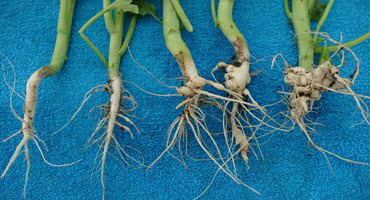“We're asking people to take a little soil sample and send it in. You can drop it off at the Sask. ministry offices throughout the province,” he told Farms.com.
While the prevalence of clubroot in Saskatchewan is currently low, the number of fields infected grows annually, said Truman.
 Clubroot “has the potential to be deadly to our industry and we need to be smart about it. We need to take control of it at the front end and not wait until it's a major problem,” he said.
Clubroot “has the potential to be deadly to our industry and we need to be smart about it. We need to take control of it at the front end and not wait until it's a major problem,” he said.
Producers should continuously scout their fields and watch for premature ripening, which can indicate clubroot. Growers should also have a good crop rotations in place and use clubroot-resistant canola varieties, said Truman.
Photo credit: Dan Orchard photo
“Canola after canola is just absolutely a sin. We can't do that because, if you (have clubroot), the spore load will increase. It'll multiply in no time,” said Truman. “The longer rotations are our best defense.”
Soil sampling should take place after producers swath or combine fields. Producers or agrologists can pick testing kits up at ministry regional offices, SaskCanola and select rural municipalities.
Vadimgouida/iStock/Getty Images Plus photo